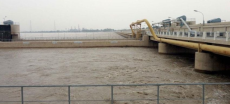[vc_row][vc_column][vc_column_text dp_text_size=”size-4″]Prior to the IMF Executive Board meeting on July 12, Pakistan would be required to notify an increase in petrol selling prices by 45-50 percent and an increase in electricity base rate by Rs3.50 to more than Rs4 per unit for FY2023-24.
A senior official from the energy ministry told that the hike in energy prices will clear the way for the $3 billion programme under the Stand-By Arrangement (SBA) negotiated with the IMF at the staff level.
“On June 2, the Oil and Gas Regulatory Authority (Ogra) announced a 50% increase (Rs415.11 per MMBTU) for Sui Northern Gas Pipeline Limited (SNGPL) customers, raising the subscribed gas price to Rs1,238.68 per MMBTU.”
“The regulator also raised the gas price for Sui Southern Gas Company Limited (SSGCL) customers by 45% (417.23 per MMBTU) for 2023-24.” However, the government has yet to announce a petrol price hike for the fiscal year 2023-24′, added the official.
“Up to FY23, the SNGPL still has a cumulative shortfall of Rs560.378 billion, while Sui Southern has a shortfall of Rs97.388 billion,” he added.
The federal government already announced that petrol prices would rise by category beginning January 1, 2023. Under the current government policy, high-end consumers cross-subsidize low-end consumers.
“From July 1, 2023, the government is most likely to maintain the policy under which high-end consumers pay the petrol price for low-end consumers.”
Also Read: LESCO Accused of Diverting Electricity from Citizens to Punjab Assembly
He claims that the whole energy sector is mired in circular debt of over Rs4,300 billion (Rs1,700 billion in the oil and gas sector and Rs2,600 billion in the electricity sector). The IMF’s senior officials want Pakistan’s government to make the energy sector more viable and sustainable by raising the rebase tariff for fiscal year 2023-24.
NEPRA may shortly issue a rebase pricing determination of Rs3.5- to more than Rs4 per unit, beginning July 1, 2023. The government would then notify it.
The most concerning aspect of the basic tariff is the payment of capacity charges, which has grown to 63 percent in the next fiscal year from 57 percent in the previous fiscal.
End users are anticipated to pay Rs1.3 to 1.5 trillion in capacity fees alone in the fiscal year 2022-23, which ends on June 30, according to Power Ministry officials.
Also Read: Power outages galore as shortfall exceeds 6,000MW
According to officials, the volume of capacity payments would increase by Rs1 trillion next year, bringing it to Rs2.5 trillion. This would boost the contribution of capacity payments alone to the base tariff by up to 63 percent.
“According to officials, the country’s installed capacity has risen to 44,000 MWs, but the economic survey for 2022-23 puts it at 41,000 MWs.” Next year, approximately 1,500 MWs will be added, resulting in higher capacity charges for end users.”
For the fiscal year 2022-23, the basic rate is the Nepra-determined tariff of Rs24.80 per unit. However, the government has announced a price of Rs24 per unit. If the necessary increase is included, the base rate for FY24 will be close to Rs29 per unit. The basic tariff, however, excludes surcharges, taxes, and duties because the application of taxes, duties, and surcharges is solely the responsibility of the federal government.
The power purchase price (PPP) accounts for 90 percent of the tariff, with capacity charges accounting for the remaining 63 percent.
At the moment, the power sector is almost unsustainable, as its circular debt has risen to over Rs2.5 trillion, and the government is unable to pay the amount owed to powerhouses in exchange for the electricity purchased from them, due to significant system losses, low recovery, and insufficient budget subsidy.[/vc_column_text][/vc_column][/vc_row]











